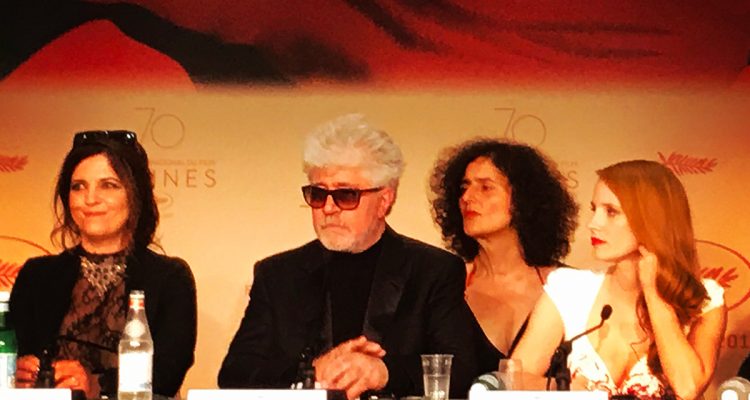CANNES – The jury of the 70th Cannes Film Festival made history — or maybe that should be “herstory.” They not only awarded the festival’s best director honor to “The Beguiled”‘s Sofia Coppola, the first time a woman has won in 50 years, but they bestowed the screenplay honor (in a tie) to “You Were Never Really Here“‘s Lynne Ramsay. Despite that, jury members Jessica Chastain, Agnès Jaoui, Maren Ade and Fan Bingbing spoke at the post-ceremony press conference about their concerns over how women were depicted in the films screened during the festival.
“This is the first time I watched 20 films in 10 days, and what I really took away from this experience is how the world views women,” Chastain says. “It was quite disturbing to me, to be honest. There were quite some exceptions. I was surprised by the representation of female characters on film.”
She continues, “I think if we include more female storytellers, I hope we have more women that I see in my own day-to-day life. They just don’t react to the men around them. They have their own point-of-view.”
Jaoui, the French filmmaker best known for directing “The Taste Of Others,” completely agreed. “It is a big issue. We need a lot more of female movies.”
Ade, whose celebrated “Toni Erdmann” was snubbed last year, wanted to make sure the public realized they didn’t give these awards to women just because they were women.
“I really have to say, I was always so happy meeting other female directors just because I found out after a while of being always [surrounded] by men, the impression comes out that it’s really not a good job for a woman, and I think that’s completely wrong,” Ade says. “I think we need more women doing film because we all want the film business to reflect modern society. I think I also agree [we’re] missing a lot of stories they might tell. Also on female characters, I also often found their view on men interesting. Not that men can’t do those films, but I agree.”
Will Smith joked-but-didn’t-joke, “A couple of black folks won’t hurt there either. We’ll talk about that in another time.”
Celebrated Chinese actress Fan also chimed in, noting, “First, I want to say I’m really happy to present this award to Sofia Coppola because she did amazing work to the audience. We just want to advocate to focus on female filmmakers in the future. This is not something I want to judge; I want to advocate, and we want to encourage, filmmakers to present more female characters. I have to say she won this prize not because she’s a female filmmaker, but because [of] the film itself.”
It was somewhat shocking for jury members to openly criticize the films selected, but responding to another question, Smith remarked about how the lack of representation was a topic of conversation. More intriguingly, some of them want to do something about it.
“This jury is composed of a global community, and [a] major part of the time we spent being sequestered how to be a part of the future of the Cannes Film Festival in opening avenues to the world to be able to bring of women [and] people of color, communities that don’t have as much access to this vibrant community,” Smith says. “Actually this morning, we had conversations about how we could open those avenues. We have some ideas. Director Park Chan-wook and I [are] forming a board and a coalition that might be able to find films and present them more effectively to the Cannes community, and by the Cannes community, I mean Thierry Frémaux and Pierre Lescure. Just open the alleyways. This jury was very focused and very intent on going beyond today to be a part of the solution to some of those difficulties.”
It’s curious how the French industry, media and Cannes director Fremaux and president Lescure will think of this. There is always ample criticism over the selections every year, but the jury’s points are very valid. Compared to the world’s other great festivals, Cannes gets strong points in its representation of Asian film. But this year in particular, the lack of African and African-American characters and films was just as striking as Chastain’s point about the depiction of women in even some of the “celebrated” films. Change may not happen at Cannes anytime soon, but this jury certainly seemed empowered to make changes in their own corners of the world.


